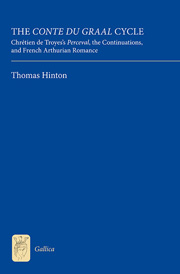 The Conte du Graal Cycle
The Conte du Graal Cycle Book contents
- Frontmatter
- Contents
- List of illustrations
- Acknowledgments
- List of Abbreviations
- Manuscript Sigla
- Introduction
- 1 Narrative Aesthetic and Cyclic Formation
- 2 Manuscripts, Memory and Textual Transmission
- 3 Authorship, Kinship and the Ethics of Continuation
- 4 Rereading the Evolution of Arthurian Verse Romance
- Conclusion
- Appendix 1 Narrative Summaries
- Appendix 2 Lengths and Dates of Texts
- Appendix 3 Manuscripts of the Conte du Graal Cycle
- Appendix 4 Full Contents of Conte du Graal Cycle manuscripts
- Appendix 5 Arthurian Verse Romances: Dates and Manuscripts
- Appendix 6 Contents of Arthurian Verse Romance Manuscripts
- Bibliography
- General Index
- Index of Manuscripts
- Miscellaneous Endmatter
4 - Rereading the Evolution of Arthurian Verse Romance
Published online by Cambridge University Press: 05 September 2013
- Frontmatter
- Contents
- List of illustrations
- Acknowledgments
- List of Abbreviations
- Manuscript Sigla
- Introduction
- 1 Narrative Aesthetic and Cyclic Formation
- 2 Manuscripts, Memory and Textual Transmission
- 3 Authorship, Kinship and the Ethics of Continuation
- 4 Rereading the Evolution of Arthurian Verse Romance
- Conclusion
- Appendix 1 Narrative Summaries
- Appendix 2 Lengths and Dates of Texts
- Appendix 3 Manuscripts of the Conte du Graal Cycle
- Appendix 4 Full Contents of Conte du Graal Cycle manuscripts
- Appendix 5 Arthurian Verse Romances: Dates and Manuscripts
- Appendix 6 Contents of Arthurian Verse Romance Manuscripts
- Bibliography
- General Index
- Index of Manuscripts
- Miscellaneous Endmatter
Summary
The narrator of the thirteenth-century Arthurian verse romance Hunbaut presents himself as having been engaged in friendly rivalry with Chrétien de Troyes:
Ne dira nus hon que je robe
Les bons dis Crestïen de Troies
Qui jeta anbesas et troies
Por le maistr[i]e avoir deu jeu,
Et juames por ce maint jeu.
(Hunbaut, vv. 186–90)[No man will say that I am stealing the good words of Chrétien de Troyes, who threw twos and threes to gain mastery of the game; we played many games in this way.]
By juxtaposing a reference to Chrétien's textual production with the description of a gambling contest, this passage invites the audience to consider the composition of Arthurian verse narrative as a game played out between its different authors. The use of the concept of ‘maistrie’ to characterise this relationship speaks of an ambivalence between companionship and challenge, fidelity and domination, which we have seen at work throughout the Conte du Graal Continuations. This conflict is doubtless less acute in Hunbaut and other thirteenth-century romances, since these are not attempting to pursue an interrupted, inherited narrative, but are free to build their plots from scratch. Thus the Hunbaut narrator is able to state more explicitly than those of the Continuations both his admiration for the ‘bon dis’ of his predecessor, and his determination to avoid following too closely in his footsteps.
- Type
- Chapter
- Information
- The Conte du Graal CycleChrétien de Troyes's Perceval, the Continuations, and French Arthurian Romance, pp. 163 - 217Publisher: Boydell & BrewerPrint publication year: 2012


